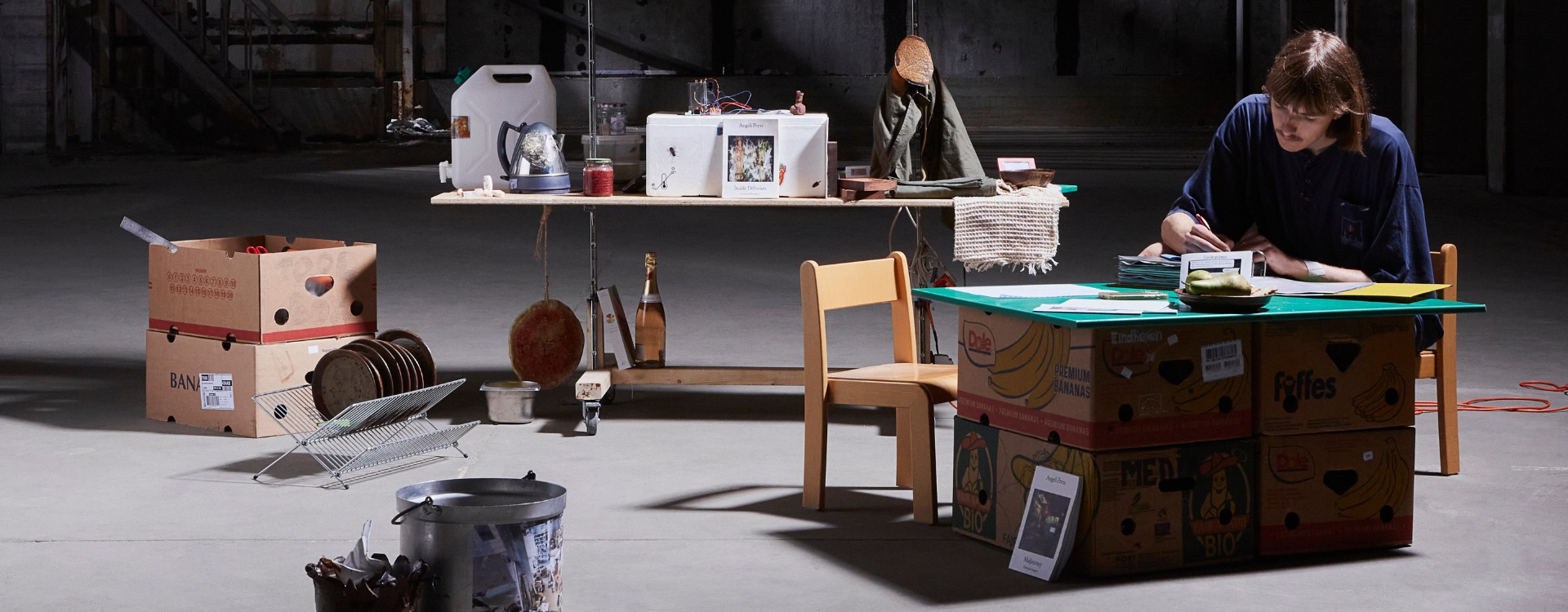It was four years of attempts to find a good life in industrial Eindhoven, the city of light. Years spent traveling inside, and through confused geographies, spotting the exotic in the ultralocal, gazing at the fission of house and factory, the intimate and the rational. And a lot of energy spent avoiding isolation. After school we all moved together to Brussels. Searching, working, balancing between burn out and bore out, figuring out what to do in a world of infinite urgencies where individual happiness seems always to lean on the exhaustion of countless others. Now we are invited to a busy fanfare week in Milan and chose to bring with us through the brenner pass fragments of past stories of friendship, dinners, and 400 coups, from eindhoven to brussels and from brussels to Milan. Our suitcase is filled with pliers, blades, and a computer; minimal gear to build, cook, and publish. We hope to reach the promised hotel room, soon to be nested, cluttered, made soft and porous to the industrial and domestic legacy in town. Melancholia, sprezzatura haunting the streets, vodka and bitterness after lunch, mastroiani fixing a lamp, the 24/7 carrefour midnight worker, isolated €1 cafes, banana boxes and flea markets, all stuffing the city’s answer to the question of how to live a good life.
BIO
Théa Brochard is a designer and a researcher currently based in Brussels. She is interested in the tension between the mainstream and the original, the standard and the alternative. She works in cycles, with a low-tech approach, hacks and repairs, in wonder of what our human needs are. Her toolkit include a sewing machine, a camera, a pen and a ruler; to schematised order in chaos, turn unique things replicable, touches the earth and objects or just fixing with tape. On her historical record, she crafted a collection of garment out of bike tube, explored funky rebuilding of glass moulds in Helsinki, researched the notion of standard in the realm of objects for her graduation in Eindhoven, and asked what repair might be about through a publication and exhibition for Emmaüs.
Nathan Raccah just graduated from the design academy Eindhoven, where he focused on matters of technicalities and conviviality. Recently he moved to a new houbuildse in Brussels, near the Zenne. Now he writes, throws pots on the wheel, some bricolage, and for a living he cooks. Altogether a practice of loosely defined poetic endeavors and career paths, attempting to build for himself and others the possibility to enjoy a good life.
Perle Venzal just graduated from the ENSAV La Cambre in Brussels.
She works mainly with fabrics at the moment, and always nourishes her work and research with tools like drawing, recording, writing. She’s interested in the malleable aspect of textiles as a way of creating alternatives realms and receptacles, might it be through a foldable hut, a blanket-map or a wearable pillow-companion. She navigates around the topics of nostalgia, childhood, dreams, the ever intertwined micro/macro aspects of things and creating inviting time-spaces/objects.
Louise Dousset’s practice involves tampering with printers, making books, and recording interactions. After graduating from Paris’ Ecole Boulle, she received her BA from Design Academy Eindhoven in 2023 with projects investigating how to make a lot with little.
Always starting development of projects at as small a scale as possible, she consciously embraces technical or cost limitations as an act of resistance and values the importance of DIY as a tool for comprehension.
She uses the bustling environment of the Montjoie house as a field to experiment with approximately functional room setups, implement her own methods of production, and build around the discoveries of sharing a home.
Ward Lauwers, another recent graduate from the Design Academy Eindhoven. Two of his favourite things are taking apart and repairing old electronics and objects and browsing through our media landscape, exploring the internet. His approach is playful, sometimes aiming for something simpler. There’s an energetic, joyful child, an old, rational man. Both taking part in a never ending dance on the double-sided blade of his life. One edge cuts the simplicity of the good old childhood town, grown up around trees and a wild garden pond. The other side bumps in the unexhaustable curiosity for our ever developing industrial world, piled up crushed car cubes, ready to shred. The two seem to hold the entirity in stability, extremes exhaust each other, each of them having their peaks,both finding presence in his work. Work that spreads out in many directions, one would see a man with a thousand hobbies. Field trips to remote industrial landscapes, open source media servers, festivitive cookies,folklore bread ovens, custom 3D printed figures with embedded electronics, recovering media, printing booklets and posters. His interests and skills are applied over multiple contexts,one for his own, one for his social environment, one for a time yet to come, to archive and snapshot our present world. Much boils down to make a good life, for us, and the many to come.
Xander Maclaren lives and works in Brussels after growing up in Toronto and studying in New York, Weimar, and Eindhoven. His work holds functionalist aesthetics in tension with frustrated expectations of real-world utility, trying to get one last buzz off the fumes of twentieth-century utopianism.His designs for layout, type, objects, and furniture are informed by a long-term practice of collecting books and mass-produced objects from 1955–1995, sifting through them for aspects that may be currently relevant in serious or funny ways. Supported through the British Council’s Circular Cultures programme. Computer Room is a research-oriented design studio comprised of Andu Masebo, Charlie Humble-Thomas & Jesse Butterfield.
Five rooms that become home and place of experimentation and encounter. Welcome to Temporary Home: a unique residence for five designers and artists from all over Europe within casaBASE, our hostel.
